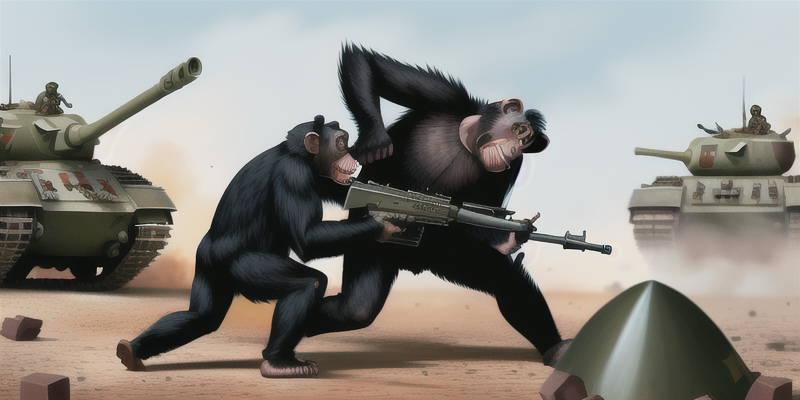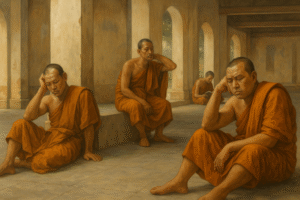Wars have profoundly influenced human history, shaping civilizations, and defining the geopolitical landscape. Yet, they signify more than tangible outcomes. Through a spiritual lens, war denotes a lower level of consciousness, a stark deviation from higher human values.
Consciousness and War
Consciousness – our awareness of ourselves and the world – shapes our understanding, perception, emotions, and actions. A high consciousness level encompasses wisdom, empathy, and compassion, whereas a lower level tends to express fear, aggression, and competition.
Wars typically arise out of this lower consciousness state. They represent an inability to address differences intellectually and peacefully, a characteristic we share with animals that primarily resolve conflicts through physical confrontation. Resorting to violence in the face of disagreements denotes a detachment from the higher intellectual and moral faculties defining us as a species.
The human race is like a sophisticated jet, built with the most advanced technology. The jet signifies our technological achievements – our mastery over the material world, our prowess in manipulating nature to our whims and fancies. This jet is equipped with weapons of mass destruction, powerful enough to obliterate our planet several times over.
But who’s the pilot of this jet? A monkey. This monkey symbolizes our consciousness, which, despite all our outward progress, is still rooted in primal instincts – fear, greed, aggression, and domination. The dichotomy could not be more striking or more dangerous. A monkey piloting a jet – can there be a more frightening prospect?
The Ripple Effect of War
Wars have far-reaching consequences, with innocent people often becoming collateral damage, and countries far removed from the conflict drawn in by political alliances, humanitarian concerns, or global economic disruptions. This reality extends from the World Wars to contemporary conflicts like the one between Ukraine and Russia.
The wars we wage, the conflicts we perpetuate, are a manifestation of this discord between our external progress and internal stagnation. Look at the pages of our history, soaked in the blood of millions, testament to our incessant fascination with power and control.
The World Wars were supposed to be lessons for humanity. They were to remind us of the folly of our ways, to guide us towards a path of peace and mutual respect. And yet, here we are, nearly a century later, still entangled in conflicts, still bathing in the blood of our brothers and sisters. The wars have changed, the weapons have changed, but have we?
From the smoldering ashes of Hiroshima and Nagasaki to the blood-stained streets of Ukraine, the song remains the same. The melody of destruction, the rhythm of regression. Yes, regression, for war is the antithesis of growth.
Wars and Technological Progress: A Misleading Paradox
Despite the significant technological advancements since World War II, little has changed in the way humans wage wars. The weapons have become more lethal, the strategies more sophisticated, and the scope of destruction wider. Technology, unfortunately, has amplified the destructive potential of war, rather than diminishing its likelihood.
This paradox signifies a disturbing disconnection between our technological growth and our spiritual and emotional evolution. The sophistication of our weaponry doesn’t reflect an equivalent advancement in our consciousness. Instead, it signifies regression, with the instinct to dominate and destroy overpowering the wisdom to collaborate and create.
We live in an age where we can communicate with someone on the other side of the world with a device that fits into the palm of our hands, and yet, we cannot communicate our differences with our neighbors without resorting to violence. Isn’t it a tragedy of cosmic proportions?
It’s time to ask ourselves: Are we really progressing as a species, or are we merely children or monkeys playing with dangerous toys, oblivious to their destructive potential?
We have mastered the science of matter, but have we understood the science of consciousness? Have we explored the vast expanse of our inner space with the same enthusiasm with which we explore outer space?
The Regressive Nature of War
Wars, with their transient victories and superficial power shifts, do not contribute to humanity’s progression. Instead, they cause regression, damaging social fabric, ravaging the environment, and stagnating intellectual and moral development. True societal progress is not measured in territorial conquests or military supremacy, but in commitment to peace, compassion, and respect for all life.
Wars underline the need for humanity to elevate its collective consciousness. They highlight our primal instincts and a detachment from our higher, refined faculties. Rather than accepting this as a fact of human nature, we should strive for change.
It’s high time we evolve our consciousness, high time the monkey matures into a responsible pilot. Only then can we hope to navigate the jet of our civilization safely through the turbulent skies of our times. Only then can we hope to replace the cacophony of war with the symphony of peace.
Remember, we are not just the products of evolution; we are the architects of it. We have the power to shape our future. Let’s shape it with love, compassion, and understanding. Only then can we truly celebrate the miracle of existence.





